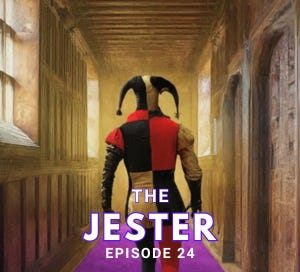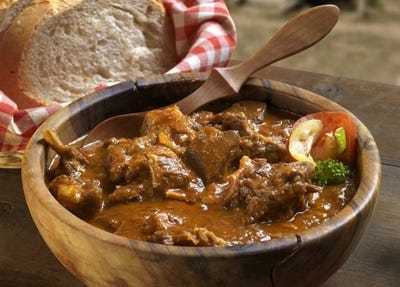Dance was frustrated.
Sitting in the common refectory in his jesting costume, he pretended to be in his cups because of Gemena’s death. He did not have to pretend much. Two days had plodded by since he had declared his determination to bring the killer to justice—to the gallows—but as yet, nothing had come of it. Because the murderer had so far acted spontaneously and impatiently, even recklessly, the jester had expected a swift reaction. During his crime spree, the villain had stolen and taunted and attacked and implicated and destroyed in quick succession. And now he has decided to take a vacation, Dance thought bitterly.
With a wave, he signaled to a serving woman to top off his tankard, and she bustled back to the kitchen for the jug he had asked her to serve him from. Perhaps someone has convinced the vile scum to lie low for a while since the king and the guard have their dander up, he speculated. Or maybe the plans for his next move are more intricate and require a longer lead time. Taking a drink of his watered-down ale, he made an exaggerated face of distaste. Nasty and weak, just as I made it.
The table he had claimed as his own held a strategic spot in the large dining hall. Since his first visit, Mardans had observed that its usual patrons—servants, clerks, guards, and visiting entertainers, artists, and craftsmen—tended to sit in the same places each meal. Regulars knew the palace guards always ate at two long tables near the kitchen so the staff could see them and serve them promptly. They were often in a hurry and rarely lingered over their meals. Usually, servants clustered around smaller tables near the main doors, and clerks did the same closer to the guardsmen. Visiting artists and craftsmen preferred the tables on the wall to the right of the doors, and servants and guards of non-resident nobles sat opposite them on the left. Only the Shepherd knew how long this seating pattern had existed. Probably since the palace was built. People are people. They keep to their habits.
Dance had chosen to sprawl drowsily upon a smaller table across from those along the left wall, receiving dark looks from a few clerks whose regular table he had usurped. There, he could eavesdrop on conversations among three of those groups. He was especially interested in what the outside guards were saying.
As a large group of them strode past him to get their dinners, he belched loudly and put his head on his crossed arms on the tabletop, breathing regularly and a bit noisily as if he were falling asleep. A few of them noticed, grumbling and cursing him as they passed. He heard himself called a “fat sod,” a “disgusting loon,” and a few other uncomplimentary terms. The epithets only made him smile, since they would now discount him and soon forget about him.
The guards shuffled through the line to get trenchers of beef stew and found their places along the long tables. Braving their ranks, a few members of the kitchen staff brought out baskets of bread and served ale. As usual, there was an exchange of ribald remarks, leers, and winks from the guards and profane and uncomplimentary rejections from the women as they beat a hasty retreat back to the kitchen’s safety. After a spate of laughter, the men dug into their meal with gusto, and most of them retrieved a second helping after downing the first, it seemed, without chewing.
Only after sitting down to consume this second portion did they begin to converse, as if by unanimous consent. They had evidently consumed a few mugs of ale with their stew as they began to talk more loudly and laugh obnoxiously at stupid, unfunny comments. Most of their banter was useless to Dance: rehashes of minor disagreements, retellings of encounters with various people, snatches of a ridiculous story or two, and some unremarkable news of the day. He began to despair that he would learn anything useful.
Then one guard burped and called loudly, “Did any of you see the cock of the walk today?”
A few of his fellows snickered, and one of them answered, “What, Tolis, you carrying a torch for him?” The others laughed.
The one named Tolis growled, “You know better! I just can’t stand his swagger. It makes me want to punch him in the face!”
There arose a general murmur of agreement. “He’s young and strong,” someone piped up, “but someone will teach him a lesson soon and bloody that pretty face. He can’t be as good as he thinks he is.”
A less-drunk voice asked, “Have you seen him train? Someone has taught him well. I saw him take down one of the prince’s officers in a practice bout last week. Took him only a minute, and the lieutenant was spitting mud. The son of a vixen had hardly broken a sweat.”
“I heard he fights dirty,” interjected another.
The less-drunk voice answered with a bark of laughter, “We all fight dirty. That’s how we stay alive.” He received a chorus of agreement, probably from the older guards among them.
After a long moment, when presumably most of them took long drafts of their ale, Tolis thoughtfully asked, “Does anyone know where he comes from?”
“He looks Aertellan,” said a new voice. “Blond and fair of skin. Strong through the back and shoulders like a bowman.”
“You been looking him over, too, Padi?” the original jokester asked. The others laughed and added their own insults.
Padi laughed with them, knowing they were just giving him a hard time. “You know I prefer brunettes!” They chuckled and returned to their ales.
After a minute, the less-drunk voice said, “I heard he trained in Tanjar. And that strange belt buckle he wears is said to be a symbol of one of their secret fighting schools. Why they would consent to train that blond blackguard is beyond me.”
“What is that symbol supposed to be anyway?” Tolis asked. “Looks creepy to me.”
Less-Drunk, as Dance now thought of him, replied, “From what I heard, the stone is supposed to represent the trained warrior, and the flat, smooth, polished eye-shape is something like the untroubled mind, a mind cleared of unnecessary distraction or worry.”
“How’d you learn about all this mambo-jumbo?” Tolis asked. “Nobody seems to know much about these Tanjari fighting schools. They are secret.”
Less-Drunk just chuckled. “Enough of us have been curious about it that someone got him to spill on it, probably just to keep us from bugging him about it all the time. From what I heard, he said it ‘helps to center him on his task,’ or some bilge like that. He speaks like that, all even-toned and calm like he’s a fighting monk or something.”
That comment got him a few laughs. Padi said above the rest, “Figures, comin’ out of Tanjar like he did.” Many of his fellows agreed.
The Tanjari are strange, true enough, Dance thought. A young, strong, handsome Aertellan with an exotic, confident manner would have intrigued Gemena.
“But he’s a killer, sure enough,” Tolis grated in his rough voice into the silence that followed. “He’s got those flat, dead eyes that don’t care whether someone lives or dies. Not an ounce of sympathy in ‘em.”
“I guess a lord could use someone like him,” Padi said, “if he had enemies he needed to get rid of.”
“Who are the Tilantas’ enemies?” Less-Drunk asked. “They’re a ducal family, are rich as Bardonnels, and live lives of ease! I haven’t heard of any feuds with other dukes or the royals. So, why would they hire a killer like him?”
“But aren’t we all killers?” Tolis asked gruffly.
“I guess, in a manner of speaking,” Less-Drunk conceded. “Our lords hire us to protect them, and we might have to kill someone trying to harm our bosses, but most of us aren’t assassins. It’s just a job we do, but we’d rather not. The cock of the walk looks like a paid killer. That’s what I mean.”
The jokester asked, “Does anyone know his name?” The guards muttered among themselves, most of them answering in the negative.
Less-Drunk finally said, “All I know is it’s some Tanjari name no one can pronounce or remember. The Tilanta crew’s captain just calls him ‘Spear’ ’cause that’s what the Tanjari name means or something like it.”
Tolis cleared his throat. “I guess I’ll ask my original question again: Did anyone see him today?” His fellows murmured they had not.
“Fact is,” Padi said. “No one ain’t seen him for a couple days. Not since the girl died. Rumor going ’round is that he might’ve done it.”
“Could be, I guess,” Less-Drunk said, “or the Tilantas sent him on some errand then by coincidence. But, by the Shepherd, I wouldn’t put it past him!”
The other guards uttered their agreement with oaths and curses on the strange Aertellan-Tanjari guard. The next moment, they clambered noisily to their feet and left the dining hall in a pack as they had come in.
Dance lifted his head and smiled. Now he had a lead.
A note:
The nation of Tanjar, bordering Margonne on its northwest frontier, was unique among Osegran states. Like the people of Haimar, the Tanjari were not related to any other peoples on the continent, having migrated to Osegra from across the Western Ocean, following their god’s command to sail into the rising sun until they found the land he had prepared for them. Under dark, straight hair, they had skin of pale gold to light bronze and dark almond-shaped eyes. Culturally, they were very insular and clannish, fighting among themselves as often as they discouraged foreigners from interacting with them. “Spear,” then, was an anomaly. That the Tanjari would instruct a pale, blond foreigner in their fighting styles was outside any of the guards’ experience. He was thus an intriguing oddity and an easy target of their hatred, especially since none of them was his equal in the martial arts.






Interesting development. Very clever of Dance to go undercover. :)